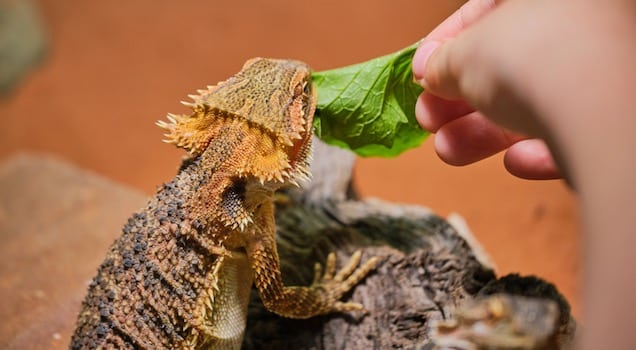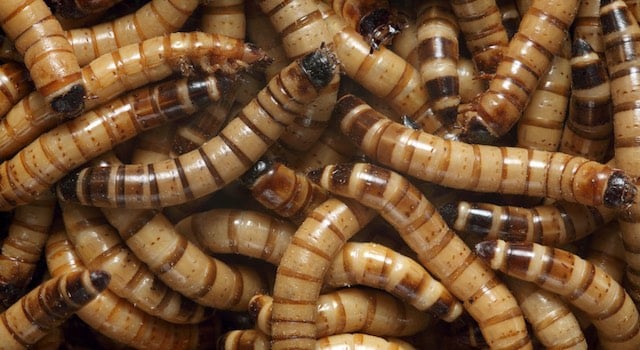
Introduction to Bearded Dragon Food
A nutritious, species-appropriate diet is the key to keeping your bearded dragon happy and healthy. The wrong diet can lead to nutritional imbalances and various health issues that can negatively impact their quality of life.
Bearded dragons are primarily omnivores, meaning they eat both plant and animal-based foods. In the wild, these reptiles feed on insects, vegetation, fruits, and occasionally smaller reptiles and rodents. It’s important to replicate this diet in captivity to ensure your bearded dragon gets all the right nutrients they need.
Basic Nutritional Needs of Bearded Dragons
The best diet for a bearded dragon is varied and balanced and provides essential nutrients for optimal health. Like any other pet, they need specific levels of protein, fat, carbohydrates, fiber, vitamins, and minerals in their diet. They should get these nutrients by eating various insects and plant-based foods. Their nutritional needs vary depending on their growth stage, so you should adjust their diet as they mature.
Hatchlings (0 – 4 Months)
Hatchling bearded dragons are primarily carnivores/insectivores, whereas adults are strictly omnivores. They need a high-protein diet to support proper growth and development. About 80% of their diet should consist of gut-loaded feeder insects, and 20% should be vegetables. They eat a ton more food at this stage and should be offered small meals at least two to three times a day.
Juveniles (4 – 12 Months)
Juveniles require a high-protein diet like hatchlings, but they can start eating more fresh leafy greens and fruit at this stage. Roughly 60 – 70% of their diet should consist of feeder insects and 30 – 40% fruits and vegetables. Once they are 6 months old, you can reduce their feedings to once daily to prevent overfeeding. Their growth rate slows at this stage, and their metabolism needs to adjust to fewer feedings.
Adults (12+ Months)
According to VCA Animal Hospitals, 50% of an adult bearded dragon’s diet should consist of animal-based foods and 50% plant-based foods. Adults should only eat every 24 to 72 hours because their metabolisms slow down once they are fully grown.
Feeder Insects for Bearded Dragons
Bearded dragons should get most of their protein intake from live feeder insects, which offer several nutritional benefits. Insects are an excellent source of digestible protein, fats, fiber, and minerals. These nutrients support healthy growth and digestion and can be used for energy. They also help to keep bearded dragons satisfied for longer between each meal.
Insects high in protein but low in fat and chitin should be offered as a staple protein source. Chitin is found in the insect’s exoskeleton and is difficult to digest in large quantities. Insects like mealworms and superworms are rich in chitin, making them more suitable as an occasional treat.
Dubia roaches and crickets are a good source of protein and calcium while being easy to digest because they have less chitin. They are also a preferred protein source because they are inexpensive and easy to maintain as feeders.
Bearded dragons should eat more insects with an ideal calcium-to-phosphorus ratio of 2:1. These minerals metabolize together and are vital for bone health and development. Feeding too many insects high in phosphorus but low in calcium can create a deficiency.
Here is a list of safe feeder insects that you can feed your bearded dragon:
- Dubia roaches
- Mealworms
- Waxworms
- Superworms
- Crickets
- Hornworms
- Soldier fly larvae
- Silkworms
- Locusts
- Butterworms
Vegetables for Bearded Dragons
All bearded dragons must eat vegetables for essential nutrients. However, adults need more vegetables in their diet than their younger counterparts because they are omnivores. Vegetables are packed with vitamins and minerals that offer numerous health benefits for bearded dragons, like improved digestion and immunity against certain health issues.
Romaine lettuce, kale, and dandelion greens are some of the best dark, leafy green vegetables for bearded dragons and can be fed daily. They are high in calcium and fiber and an excellent source of vitamins A, C, and K. These vitamins play an important role in a bearded dragon’s eye and skin health and boost immune function. Vegetables like carrots, pumpkin, bell peppers, and peas can be offered a few times a week alongside leafy greens.
Both raw and cooked vegetables are safe to feed, but raw veggies are preferred because they retain more nutrients.
Here’s a list of some safe vegetables for bearded dragons:
- Collard greens
- Romaine lettuce
- Mustard greens
- Bok choy
- Kale
- Sweet potato
- Carrot
- Zucchini
- Turnip greens
- Broccoli
- Peas
- Bell peppers
- Carrots
- Dandelion greens
- Red leaf lettuce
- Squash
Fruits That Bearded Dragons Can Eat
Bearded dragons need less fruit in their diet compared to insects and vegetables. Experts at PetMD advise that fruit should make up no more than 5% of their total diet. Fruits are packed with important vitamins, minerals, and antioxidants but are high in natural sugars. Bearded dragons don’t digest high amounts of sugar well, so it’s better to feed fruits in moderation.
The antioxidants found in most fruits protect against inflammation and strengthen the immune system. Also, fruits add flavor and variety to their diet, which encourages a healthy appetite.
Here’s a list of safe fruits to feed your bearded dragon in moderation:
- Strawberries
- Melon
- Banana
- Apples
- Figs
- Guava
- Kiwi
- Peaches
- Papaya
- Blueberries
Other Foods and Treats for Bearded Dragons
Bearded dragons can eat commercial dry foods and tasty flowers in addition to their main diet.
Commercial dry foods are specifically formulated to meet the nutritional requirements of bearded dragons and are available in a pellet form. They contain the right balance of vitamins, minerals, and protein these reptiles need, but they still aren’t nutritious enough to be fed alone. It’s better to feed them alongside live insects, vegetables, and fruits for optimal nutrition.
Flowers are tasty treats that most bearded dragons love and provide nutrients that benefit their health, too. Flowers are rich in beneficial vitamins A, C, potassium, and calcium, along with antioxidants that help to reduce inflammation and improve eye health.
Here’s a list of some safe flowers for bearded dragons:
- Hibiscus
- Marigold
- Calendula
- Rose petals
- Chamomile
- Nasturtium
- Dandelion
Preparing and Serving Food for Bearded Dragons
It’s important to prepare and serve your bearded dragon’s food correctly to reduce the risk of choking, pesticide contamination, and overfeeding.
Fruits and vegetables must be thoroughly rinsed to remove any pesticide residue and dirt. Ideally, you only want to feed organic, pesticide-free produce. They should also be cut into bite-size pieces to prevent choking or digestive issues. Make sure each piece of food is no larger than the space between your bearded dragon’s eyes, which will vary depending on their age and size.
It’s also important to gut-load feeder insects at least six hours before they are fed to your bearded dragon. Gut-loading diets are rich in essential vitamins and minerals, which improve the insect’s nutritional value and get passed to your bearded dragon after ingestion.
Feeders should also be dusted with vitamin D3 and calcium supplements two to three times a week. Vitamin D3 and calcium are crucial for bone health and help prevent health issues like metabolic bone disease and mouth rot.
Feeding Techniques and Encouraging Appetite
You can try the following methods to encourage your bearded dragon to eat, whether it’s because they are hesitant to try new foods or are recovering from an illness.
- Offer a varied diet: A varied diet consisting of different insects, vegetables, fruits, and treats keeps your bearded dragon’s diet interesting. These reptiles enjoy different flavors and textures and can get bored if their diet lacks this.
- Food freshness: Ensure their food is fresh and stored appropriately so that it doesn’t spoil early. Feeder insects should be kept in clean, well-maintained conditions. Remove any uneaten food from the enclosure after two hours.
- Gradually introduce new foods: Offering too many new foods at once can upset your bearded dragon’s stomach. New foods should be gradually introduced into their diet so that they can adjust.
- Live prey: Bearded dragons prefer to hunt and eat live insects and don’t favor freeze-dried or pre-killed insects as much. Hunting is a natural behavior and encourages them to eat.
Foods to Avoid
There are so many foods that are safe for bearded dragons, but an equal amount are unsafe and should be avoided.
Bearded dragons should never eat wild-caught insects, which often have harmful parasites and diseases that can make them very ill. Only commercial feeder insects from a pet store are safe to feed.
Foods like avocados, garlic, and onions are toxic to bearded dragons and are unsafe to feed, even in small amounts. Furthermore, foods formulated for other types of pets, like dog or cat food, are not suitable for these reptiles and can lead to malnutrition or severe nutritional imbalances.
Fruits and vegetables high in phosphorus, goitrogens, and oxalates should be fed sparingly. Bearded dragons should primarily eat foods with double the amount of calcium than phosphorus. Too much phosphorus can create an imbalance in these minerals, which can negatively affect their bone health.
Goitrogens are compounds naturally found in many vegetables and fruits, such as broccoli, strawberries, cabbage, and bok choy. These compounds can interfere with your bearded dragon’s iodine intake and may cause hormonal issues. This is usually only a concern if goitrogen-rich foods are fed often, so they are safe in moderation.
Like goitrogens, oxalates are compounds that can disrupt a bearded dragon’s normal bodily functions if fed in excess. Oxalates bind calcium in their digestive tract, making it difficult for them to absorb calcium properly. Foods like raw spinach, rhubarb, Swiss chard, and raspberries are high in oxalates and shouldn’t be fed more than three times a month.
Here’s a list of foods you shouldn’t feed your bearded dragon:
- Onions
- Garlic
- Dog and cat food
- Raw meat
- Box elder insects
- Iceberg lettuce
- Rhubarb
- Swiss chard
- Avocados
- Raspberries
- Wild-caught insects
- Venomous insects
Health Benefits of a Balanced Diet
- Improved health and longevity: A balanced diet provides bearded dragons with all the nutrients they need to live a long, healthy life.
- Prevents certain diseases: Nutritional deficiencies caused by an imbalanced diet can lead to health issues like metabolic bone disease. This serious condition is primarily caused by a lack of calcium and vitamin D3 supplements, which should be included in a healthy diet.
- Supports growth and development: Although a balanced diet is important at any stage of a bearded dragon’s life, it’s especially important for young bearded dragons. They need high amounts of protein, vitamin and mineral supplements, and plant-based foods to support healthy growth and development.
FAQs About Bearded Dragon Nutrition
Do bearded dragons need dietary supplements?
Yes, bearded dragons need calcium and vitamin D3 supplements in their diet. They get traces of these nutrients from their food, but a supplement is necessary to prevent nutritional deficiencies or imbalances.
Do bearded dragons have to eat insects?
Bearded dragons are omnivores and must eat insects as part of a healthy diet. Insects provide essential protein, fat, fiber, moisture, vitamins, and minerals that bearded dragons need to thrive. Baby bearded dragons need to eat more insects than adults because they are still growing.
Conclusion
By feeding your bearded dragon a healthy, balanced diet, you are helping to improve their overall well-being and longevity. Their diet must consist of insects, supplements, and a selection of fruits and vegetables.
Their nutritional requirements will vary depending on their age, with hatchlings and juveniles requiring more insects in their diets than adults. They need calcium and vitamin D3 supplements to prevent metabolic bone disease, even if they have a UVB light in their enclosure. Lastly, fruits can be fed as an occasional treat to add variety to their diet and for their beneficial antioxidants.



